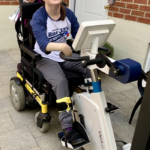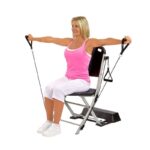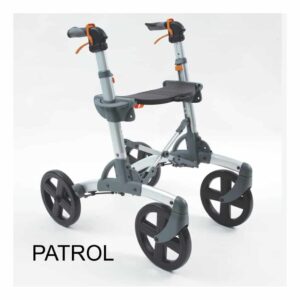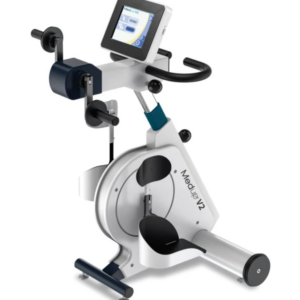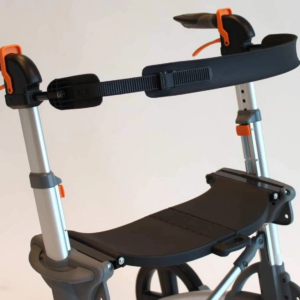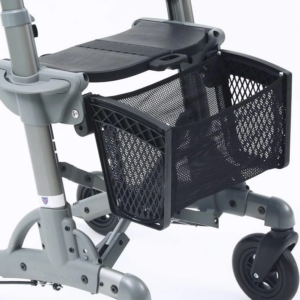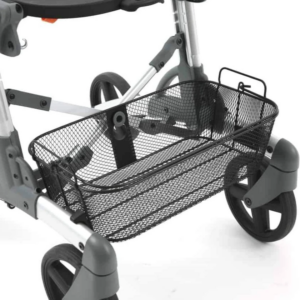
Going for regular walks has many benefits for people of all ages, especially for aging seniors. Maintaining mobility is the best way to stay fit, healthy and thrive with improved mental health for years to come.
We explore the key benefits of walking for seniors, and further offer tips on how you (or your loved one) can get started!
Do you imagine walking trails or having the freedom to spend more time outdoors but feel you can’t? Does your walker limit you? Volaris rollator walkers s may be your access to greater freedom and health! Our models feature rugged flex-frames and all-terrain wheels with seat’s built in – so you can rest as needed.
Help you maintain or improve your weight
Walking at a brisk pace for an hour a day can significantly reduce the effects of obesity as you age. Even if you can only manage to get moving for a fraction of that, walking is going to have positive effects on your weight. Walking regularly has also been shown to reduce cravings for sugary and sweet foods.
Improve your immune system and decrease risk of disease
Walking just 20 minutes a day, 5 days each week can help boost your immune system and allow your body to better fight off illness. It can also help to lower your risks of developing heart disease, diabetes, stroke and even some cancers.
Strengthen bones and muscles
This low impact, whole body workout is perfect for those looking to keep moving without stressing out their body too much. The regular movements required when walking can help lubricate joints, strengthen the supportive muscles in your stomach and back and even reduce the chances of developing osteoporosis.
Can lower blood sugar
When you go for even a 15-minute walk after a meal your body is able to reduce the natural spike in blood sugar that some seniors might be prone to experience.
Improves mood and confidence
Going for a walk, whether outside or in, can be a great way to improve your mental health. Walking helps to release endorphins which are feel-good chemicals in your body, and helps you to breathe more deeply which can increase the flow of oxygen to your brain, thereby improving your mood.
Reduces pain
Though you might think that physical activity like walking might increase pain from arthritis and other chronic or localized conditions, it can actually do the opposite. Walking just 20 minutes, three times a week can help strengthen the muscles in your knees, hips, back, and abdomen which can decrease pain and improve your overall mobility.
Improves socialization
Going for a walk is a great way to get out with your friends or meet new people. Whether you join a local walking club, take up mall walking or just circle around your neighbourhood, the benefits of engaging with people you see while out on your walks are significant for your mental wellbeing.
Increases the ability to age in place
When seniors take regular walks, they won’t just experience mental and physical benefits. They may even maintain or improve their physical health to the point where they can hold onto their independence and stay in their home for longer than if they didn’t exercise.
Can help slow mental decline and dementia
Studies have shown that walking regularly can help seniors experience lower incidents of cognitive decline and slow the onset of mental disorders like dementia and Alzheimer’s. In fact, the more that subjects walked, the lower their rates of mental decline would drop.
Improve heart health
Walking is known to help improve circulation, lower blood pressure and help prevent heart disease and stroke. Making an effort to get your heart rate up each day can help prevent, treat and reduce the occurrence of many heart related issues.
Help you sleep better
Putting your body to work with a walk in the morning can actually lead to better sleep in the evening. Tiring out your body and muscles can allow you to have an easier time falling and staying asleep at night.
How to get started with regular walks
If you are looking to add a regular walk to your routine or wanting to help a senior you know incorporate this activity into their days, there are a few important things to keep in mind.
Start small – Just like you wouldn’t start out running a marathon, don’t start by planning too long of a walk. Especially if walking is new to the routine, start with a short walk around the block a couple times a week and slowly work up to longer ones.
Don’t walk too fast – A good guideline to follow is to walk fast enough that you feel like you’re actually exercising, but not so fast that you’re out of breath and can’t carry a conversation.
Check the forecast – As bodies age they become more susceptible to weather swings and have trouble handling very hot or cold weather.
Wear good shoes – Proper walking shoes can help reduce the chance of injury.
Walk with friends – Seek out a walking buddy if you prefer. Chatting while walking can make you walk/exercise longer than you realize. At the same time, you’ll pass time and make new friends.
Get a Rollator Walker – Don’t let your limited mobility hold you back more than it should. There are excellent, all-terrain rollator walkers available that help you walk where you thought you couldn’t at all, or help you walk further for increased health benefits!
If you’re ready to get started, then that’s the first “step” towards better health. See you outside!

